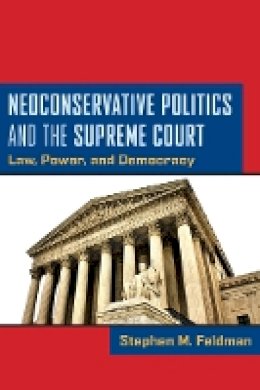
Neoconservative Politics and the Supreme Court: Law, Power, and Democracy
Stephen M Feldman
In this concise, timely book, constitutional law expert Stephen M. Feldman draws on neoconservative writings to explore the rise of the neocons and their influence on the Supreme Court. Neocons burst onto the political scene in the early 1980s via their assault on pluralist democracy’s ethical relativism, where no pre-existing or higher principles limit the agendas of interest groups. Instead, they advocated for a resurrection of republican democracy, which declares that virtuous citizens and officials pursue the common good. Yet despite their original goals, neocons quickly became an interest group themselves, competing successfully within the pluralist democratic arena. When the political winds shifted in 2008, however, neocons found themselves shorn of power in Congress and the executive branch. But portentously, they
still controlled the Supreme Court.
Neoconservative Politics and the Supreme Court explains how and why the neoconservatives criticized but operated within pluralist democracy, and, most important, what the entrenchment of neocons on the Supreme Court means for present and future politics and law.
Product Details
About Stephen M Feldman
Reviews for Neoconservative Politics and the Supreme Court: Law, Power, and Democracy
Sanford Levinson,author of Framed: America’s 51 Constitutions and the Crisis of Governance A helpful explanation of the Supreme Court's latest lurch to the right. By showing how many of the Court's latest decisions can be seen as expressions of the neoconservative impulse, Feldman exposes how deeply politics, personalities, and convictions shape judicial behavior.
Richard Delgado,University Professor of Law, Seattle University In forthright prose laying out a provocative and subtle argument, Feldman places todays Supreme Court in a broad intellectual and historical context, showing how the Courts conservatives cut and paste themes of neo-conservative nostalgia for an irretrievable past of republican democracy into more traditionalist conservative responses to the pluralist democracy we have and are likely to continue to have.
Mark Tushnet,author of A Court Divided: The Rehnquist Court and the Future of Constitutional Law In this concise and clearly written book, Stephen M. Feldman argues that the conservative ascendance in the United States since the presidency of Ronald Reagan can be understood as an effort to reestablish the legal and political order that existed prior to the New Deal. He labels this pre-New Deal order 'republican democracy,' distinct from the 'pluralist democracy' that characterizes our politics since 1937. The heart of the book is the analysis of the Supreme Court and how its conservative majority has pushed this agenda....[T]his is a provocative and compelling argument.
Robert B. Horwitz
Political Science Quarterly
This is a well-written, interesting, and useful book. Summing Up: Highly recommended.
CHOICE
